Intro
Learn about Naproxens maximum daily dose, dosage guidelines, and safety precautions to minimize side effects, ensuring safe and effective pain management with this NSAID medication.
Naproxen is a nonsteroidal anti-inflammatory drug (NSAID) commonly used to treat pain, inflammation, and fever. It is available over-the-counter (OTC) and by prescription, and is marketed under various brand names, including Aleve and Naprosyn. The maximum daily dose of naproxen varies depending on the specific product and the individual's medical condition.
The importance of understanding the maximum daily dose of naproxen cannot be overstated. Taking too much naproxen can increase the risk of serious side effects, including stomach ulcers, bleeding, and kidney damage. On the other hand, taking too little may not provide adequate relief from pain and inflammation. Therefore, it is essential to follow the recommended dosage instructions and consult with a healthcare professional if you have any questions or concerns.
Naproxen is widely used to treat a variety of conditions, including arthritis, tendinitis, and menstrual cramps. It works by blocking the production of prostaglandins, which are hormone-like substances that cause pain and inflammation. Naproxen is generally well-tolerated, but it can cause side effects, such as stomach upset, dizziness, and headache. In rare cases, naproxen can cause more serious side effects, such as liver damage and allergic reactions.
Naproxen Dosage and Administration
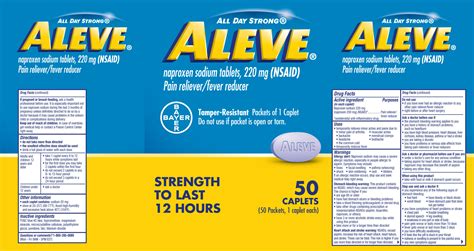
The dosage and administration of naproxen vary depending on the specific product and the individual's medical condition. The recommended dose of naproxen for adults is 250-500 mg every 8-12 hours, not to exceed 1250 mg in 24 hours. For children, the recommended dose is 10-20 mg/kg per day, divided into two or three doses. Naproxen can be taken with or without food, but taking it with food may help reduce stomach upset.
Naproxen Tablets and Capsules
Naproxen tablets and capsules are available in various strengths, including 250 mg, 375 mg, and 500 mg. The recommended dose for adults is 250-500 mg every 8-12 hours, not to exceed 1250 mg in 24 hours. Naproxen tablets and capsules can be taken with or without food, but taking them with food may help reduce stomach upset.Naproxen Side Effects and Interactions

Naproxen can cause a variety of side effects, including stomach upset, dizziness, and headache. In rare cases, naproxen can cause more serious side effects, such as liver damage and allergic reactions. Naproxen can also interact with other medications, including blood thinners, diabetes medications, and blood pressure medications.
Naproxen and Stomach Ulcers
Naproxen can increase the risk of stomach ulcers and bleeding, especially when taken in high doses or for extended periods. To reduce the risk of stomach ulcers, it is recommended to take naproxen with food and to avoid taking it with other medications that can increase the risk of stomach ulcers, such as aspirin and corticosteroids.Naproxen Maximum Daily Dose for Specific Conditions
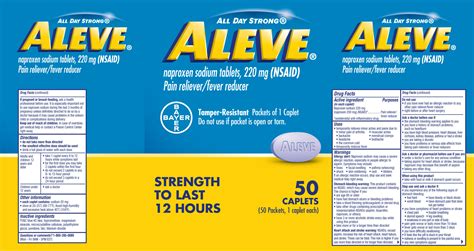
The maximum daily dose of naproxen varies depending on the specific condition being treated. For example, the recommended dose for osteoarthritis is 250-500 mg every 8-12 hours, not to exceed 1250 mg in 24 hours. For rheumatoid arthritis, the recommended dose is 500-1000 mg every 8-12 hours, not to exceed 1500 mg in 24 hours.
Naproxen for Menstrual Cramps
Naproxen is commonly used to treat menstrual cramps and other symptoms associated with menstruation. The recommended dose for menstrual cramps is 250-500 mg every 8-12 hours, not to exceed 1250 mg in 24 hours. Naproxen can be taken as needed, but it is recommended to start taking it as soon as symptoms appear.Naproxen Overdose and Toxicity

Taking too much naproxen can increase the risk of serious side effects, including stomach ulcers, bleeding, and kidney damage. If you suspect an overdose, it is essential to seek medical attention immediately. Symptoms of naproxen overdose may include nausea, vomiting, abdominal pain, and dizziness.
Naproxen Toxicity and Liver Damage
Naproxen can cause liver damage, especially when taken in high doses or for extended periods. To reduce the risk of liver damage, it is recommended to take naproxen as directed and to avoid taking it with other medications that can increase the risk of liver damage, such as acetaminophen and aspirin.Naproxen Contraindications and Warnings
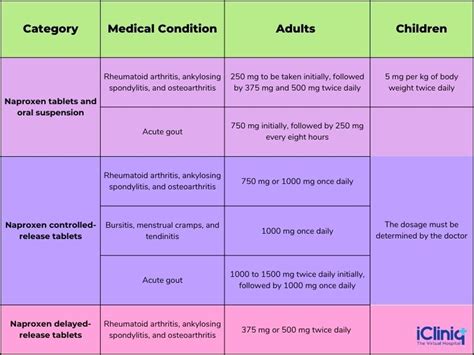
Naproxen is contraindicated in certain individuals, including those with a history of stomach ulcers, bleeding disorders, and kidney disease. Naproxen can also interact with other medications, including blood thinners, diabetes medications, and blood pressure medications.
Naproxen and Pregnancy
Naproxen is not recommended during pregnancy, especially during the third trimester. Naproxen can increase the risk of premature closure of the ductus arteriosus, a fetal blood vessel that normally closes after birth.Naproxen Drug Interactions
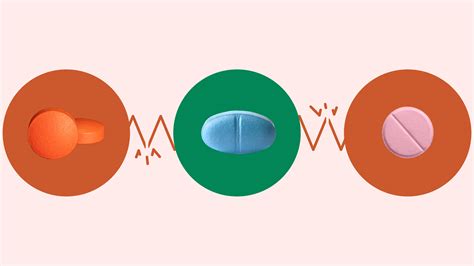
Naproxen can interact with other medications, including blood thinners, diabetes medications, and blood pressure medications. To reduce the risk of interactions, it is recommended to take naproxen as directed and to avoid taking it with other medications that can increase the risk of interactions.
Naproxen and Aspirin
Naproxen can increase the risk of stomach ulcers and bleeding when taken with aspirin. To reduce the risk of interactions, it is recommended to take naproxen and aspirin at least 30 minutes apart.Naproxen Maximum Daily Dose for Children
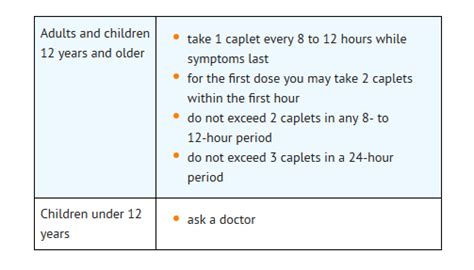
The maximum daily dose of naproxen for children varies depending on the child's age and weight. For children under 12 years old, the recommended dose is 10-20 mg/kg per day, divided into two or three doses. For children 12 years old and older, the recommended dose is 250-500 mg every 8-12 hours, not to exceed 1250 mg in 24 hours.
Naproxen for Juvenile Idiopathic Arthritis
Naproxen is commonly used to treat juvenile idiopathic arthritis. The recommended dose for children with juvenile idiopathic arthritis is 10-20 mg/kg per day, divided into two or three doses.What is the maximum daily dose of naproxen for adults?
+The maximum daily dose of naproxen for adults is 1250 mg in 24 hours.
Can naproxen be taken with other medications?
+Naproxen can interact with other medications, including blood thinners, diabetes medications, and blood pressure medications. To reduce the risk of interactions, it is recommended to take naproxen as directed and to avoid taking it with other medications that can increase the risk of interactions.
What are the common side effects of naproxen?
+The common side effects of naproxen include stomach upset, dizziness, and headache. In rare cases, naproxen can cause more serious side effects, such as liver damage and allergic reactions.
Can naproxen be taken during pregnancy?
+Naproxen is not recommended during pregnancy, especially during the third trimester. Naproxen can increase the risk of premature closure of the ductus arteriosus, a fetal blood vessel that normally closes after birth.
What is the recommended dose of naproxen for children?
+The recommended dose of naproxen for children varies depending on the child's age and weight. For children under 12 years old, the recommended dose is 10-20 mg/kg per day, divided into two or three doses. For children 12 years old and older, the recommended dose is 250-500 mg every 8-12 hours, not to exceed 1250 mg in 24 hours.
In summary, naproxen is a commonly used medication for treating pain, inflammation, and fever. The maximum daily dose of naproxen varies depending on the specific condition being treated and the individual's age and weight. To reduce the risk of side effects and interactions, it is essential to take naproxen as directed and to avoid taking it with other medications that can increase the risk of interactions. If you have any questions or concerns about naproxen, it is recommended to consult with a healthcare professional. We encourage you to share this article with others and to leave a comment below if you have any questions or concerns about naproxen. Additionally, you can visit our website for more information on naproxen and other medications.
